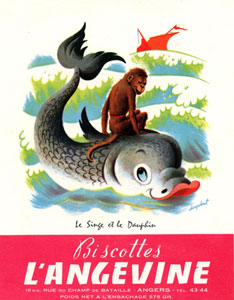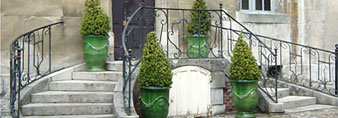THE ASS AND LAP-DOG (IV, 5)
Our talent we should never force,
We shall do nothing with a grace ;
A clown, with all his wit, of course
Will never fill a gallant's place.
There are but few so favoured upon earth
Who have the gift of pleasing from their birth :
Such gift's not for them, they must let it pass,
Or else look like the fabled ass,
Who to be dearer to his master's breast,
Went to caress him and to be caressed.
What ! ” said he, muttering in his mind,
Shall all to Tray, because he’s small, be kind !
And I have nought but cruel blows,
While he with master and with mistress goes !
He gives his paw, I’ll give it too,
And I like him will get a kiss ;
If ’tis but that to share his bliss,
’Tis not so difficult to do.”
Charmed with the thought, to stand no more aloof,
Seeing his master in a merry pin,
Slouching along, he raised a worn-out hoof,
And laid it lovingly upon his chin :
And to give boldness ornament and grace,
Broke forth a-braying in his master's face. "
“So ho !” he cried, “ what do I feel and hear !
Ho ! Thomas ! ” Thomas soon drew near ;
Then the ass changed his tone.
The comedy is done. |
|
THE BATTLE OF THE RATS AND WEASELS (IV, 6)
The weasel nation like the cats
Bears no goodwill unto the rats ;
And but that these, with narrow doors,
Defend the homes where they repose,
The long-backed beast with slender nose,
Would daily sweep them off by scores.
It happened once, as we are told,
The rats were numerous and bold ;
Their prince, whose name was Ratoshield,*
Sent forth an army to the field.
Forth also came the weasel train,
With colours flying o'er the plain.
If we believe what fame has sung,
The victory long doubtful hung ;
Many a furrow of the land
Drank the blood of many a band.
But far the greater havoc lay
Among the Rats that fatal day,
Spite of their generals, Artarpax,
Meridarpax, and Psicarpax,
Who bore the battle's burning heat,
Covered with blood, and dut, and sweat.
At last they all resistance lost,
And fled before the weasel host ;
As fast as they could fly they fled,
Their nimble captains at their head.
The princes all that day were slain,
Their holes the common soldiers gain ;
With ease to their retreats they ran,
But the great lords that led the van,
With heads and nodding plumes so high,
Telling their grandeur to the sky,
Made to strike weasels with dismay,
Perished upon the field that day.
The holes and crevices were small,
They could not enter in at all.
The common herd escaped their fate,
The greatest loss was of the great.
The heads that thus in feathers rise,
Are often humbled by surprise.
Too lordly equipage may meet
Some hindrance in a narrow street.
The humble still slip easy through
Where pomp and pride can nothing do. |
|
|
THE MONKEY AND DOLPHIN (IV, 7)
The Greeks, when travelling by sea, of old,
Took with them pugs, and dancing-dogs, we're told.
A ship with such upon her deck,
Not far from Athens went to wreck ;
But for the dolphin all were lost,
And none had seen his native coast.
The dolphin’s partial to our race,
Pliny believed so in his days,
And we must credit what he says.
He saved as fast as he could save.
A monkey, tossing on the wave,
Thought he might profit by his shape,
To mimic man, and make escape,
Deceived, in fine, the fishy hack,
And gravely mounted on his back.
He seemed the singer famed of yore ;
But as they nearly gained the shore,
The dolphin thus by chance did say
“ Are you from Athens, neighbour, pray ? ”
“ Yes--there I'm known to not a few,
If you have anything to do,
You may commit it to my care ;
My friends are high in office there,
My second cousin is lord-mayor.”
“ Many kind thanks,” the dolphin bowed ;
“ Pirœus, may I be allowed,
Is often of your presence proud ? ”—
“ Ay, sure ! an ancient friend of mine,
We every day together dine. ”—
Poor pug, whose tongue too glibly ran,
A harbour took for name of man.
Many such Cockney travellers roam,
Who Chelsea take for ancient Rome :
They speak of all they have not seen,
As if upon the spot they'd been.
The dolphin smiled ; his head turned round,
And wondered, as he took a peep,
To see what thing had scaped the deep,—
A beast that had as well been drowned.
So tossed him off at once, and then
Went back in search of drowning men. |

|
THE MAN AND WOODEN IDOL (IV, 8)
A certain pagan kept a god of wood,
The hard-of-hearing sort, though formed with ears,
From which he hoped some wondrous good,
And wasted wealth on him for years.
By vows and offerings himself he bound,
And oxen sacrificed with garlands crowned.
No idol of the numerous host
Could such a greasy kitchen boast.
Yet for such worship paid from day to day,
He gained no favour, fortune, luck at play ;
Nay, worse, if but a capful of a storm
Gathered around, in any place or form,
He had his portion of the common. curse,
The god still drew the pittance from his purse.
At last the man lost piety and dread,
He seized a crowbar, broke the idol’s head :
’Twas full of gold. “ I have been kind to thee,
And hast thou,” cried he, “ brought a doit to me ?
Off ! quit my house--seek altars among fools;
Thou’rt like those natures senseless as their tools
Like every stupid wretch with head so thick
That nothing yields without a stick.
The more I gave the less I found my own ;
I have done well to change my tone. ” |
|



